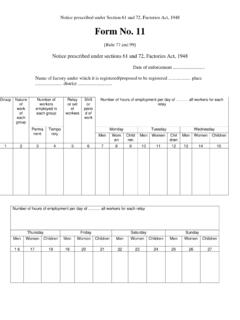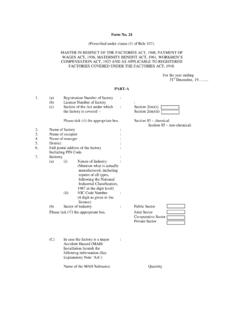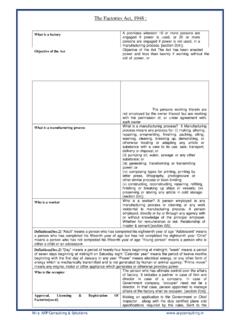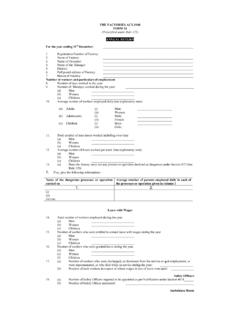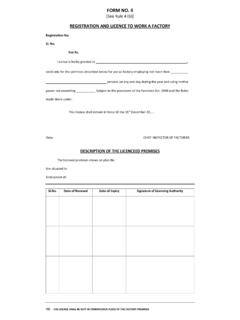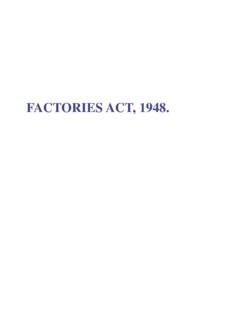Transcription of THE FACTORIES ACT, 1948 - hrylabour.gov.in
1 The Factory Act, 1948 i THE FACTORIES ACT, 1948 INDEX Sec. Particulars Page CH. I PRELIMINARY 1. Short title, extent and commencement. 1 2. Interpretation. 1 3. References to time of day. 5 4 Power to declare different departments to be 5 5. Power to exempt during public emergency. 5 6. Approval, licensing and registration of FACTORIES . 5 7. Notice by occupier. 7 7A. General duties of the occupier. 8 7B. General duties of manufactures, etc., as regards articles and substances for use in FACTORIES . 8 CH. II THE INSPECTING STAFF 8. Inspectors. 10 9. Powers of Inspectors. 10 10. Certifying surgeons. 11 CH. III HEALTH 11. Cleanliness. 12 12. Disposal of wastes and effluents. 14 13. Ventilation and temperature. 14 14. Dust and fume. 15 15. Artificial humidification. 15 16. Overcrowding. 15 17. Lighting. 16 18. Drinking water. 16 19. Latrines and urinals. 17 20. Spittoons. 17 CH.
2 IV SAFETY 21. Fencing of machinery. 18 22. Work on or near machinery in motion. 19 23. Employment of young persons on dangerous machines. 20 24. Striking gear and devices for cutting off power. 20 25. Self-acting machines. 21 26. Casing of new machinery. 21 27. Prohibition of employment ofwomen and children near cotton openers. 22 28. Hoists and lifts. 22 ii Section Particulars Page 29. Lifting machines, chains, ropes and lifting tackles. 23 30. Revolving machinery 24 31 Presssure plant. 24 32. Floors, stairs and means of access. 25 33. Pits, sumps, openings in floors, etc. 25 34. Excessive weights. 25 35. Protection of eyes. 25 36. Precautions against dangerous fumes, gases, etc. 26 36A. Precautions regarding the use of portable electric light. 26 37. Explosive or inflammable dust, gas, etc. 26 38. Precautions in case of fire. 27 39. Power to require specifications of defective parts or tests of stability.
3 28 40. Safety of buildings and machinery. 28 40A. Maintenance of buildings. 28 40B. Safety Officers 29 41. Power to make rules to supplement this Chapter. 29 CH. IV A PROVISIONS RELATING TO HAZARDOUS PROCESSES 41A. Constitution of Site Appraisal Committees. 29 41C Specific responsibility of the occupier in relation to hazardoue processes. 31 41D Power of Central Government to appoint Inquiry Committee. 32 41E Emergency standards. 32 41F Permissible limits of exposure of chemical and toxic substances. 33 41G Workers participation in safety management. 33 41H Right of workers to warn about imminent danger. 33 CH. V WELFARE 42. Washing facilities. 34 43. Facilities for storing and drying clothing. 34 44. Facilities for sitting. 34 45. First-aid appliances. 34 46. Canteens. 35 47. Shelters, rest rooms and lunch rooms. 35 48. Creches. 36 49. Welfare officers. 36 50. Power to make rules to supplement this Chapter.
4 36 CH. VI WORKING HOURS OF ADULTS 51. Weekly hours. 37 53. Compensatory holidays. 37 54. Daily hours. 37 The Factory Act, 1948 Section Particulars Page iii 55. Intervals for rest. 38 56. Spreadover. 38 57. Night shifts. 38 58. Prohibition of overlapping shifts. 38 59. Extra wages for overtime. 38 60. Restriction on double employment. 39 61. Notice of periods of work for adults. 40 62. Register of adult workers. 41 63. Hours of work to correspond with notice under section 61 and register under section 62. 41 64. Power to make exempting rules. 41 65. Power to make exempting orders. 43 66. Further restrictions on employment of women. 44 CH. VII EMPLOYMENT OF YOUNG PERSONS 67. Prohibition of employment of young children. 45 68. Non-adult workers to carry tokens. 45 69. Certificates of fitness. 45 70. Effect of certificate of fitness granted to adolescent. 46 71. Working hours for children.
5 46 72. Notice of periods of work for children. 47 73. Register of child workers. 47 74. Hours of work to correspond with notice under section 72 and register under section 73. 48 75. Power to require medical examination. 48 76. Power to make rules. 48 77. Certain other provisions of law not barred. 48 CH. VIIIANNUAL LEAVE WITH WAGES 78. Application of Chapter. 49 79. Annual leave with wages. 49 80. Wages during leave period. 52 81. Payment in advance in certain cases. 52 82. Mode of recovery of unpaid wages. 53 83. Power to make rules. 53 84. Power to exempt FACTORIES . 53 CH. IX SPECIAL PROVISIONS 85. Power to apply the Act to certain 53 86. Power to exempt public institutions. 54 87. Dangerous operations. 54 87A Power to prohibit employment on account of serious 55 88. Notice of certain accidents 55 88A Notice of certain dangerous occurrences 55 iv Section Particulars Page 89.
6 Notice of certain diseases. 56 90. Power to direct enquiry into cases of accident or disease. 56 91. Power to take samples. 57 91A. Safety and occupational health surveys 57 CH. X PENALTIES AND PROCEDURE 92. General penalty for offences. 58 93. Liability of owner of premises in certain circumstances. 59 94. Enhanced penalty after previous conviction. 60 95. Penalty for obstructing Inspector. 61 96. Penalty for wrongfully disclosing results of analysis under section 91 61 96A Penalty for contravention of the provisions of sections 41B, 41C and 41H. 61 97. Offences by workers. 61 98. Penalty for using false certificate of fitness. 61 101. Exemption of occupier or manager from liability in certain cases. 62 102. Power of Court to make orders. 63 103 Presumption as to employment. 63 104 Onus as to age. 63 104A Onus of proving limits of what is practicable, etc 63 105 Cognizance of offences.
7 63 106 Limitation of prosecutions. 63 106A Jurisdiction of a court for entertaining proceedings, etc., for 64 CH. XI SUPPLEMENTAL 107. Appeals. 64 108. Display of notices. 65 109. Service of notices. 65 110. Returns. 65 111. Obligations of workers. 65 or workers, etc. 65 112. General power to make rules. 66 113. Powers of Centre to give directions. 66 114. No charge for facilities and conveniences. 66 115. Publication of rules. 66 116. Application of Act of Government FACTORIES . 66 117. Protection to persons acting under this Act. 66 118. Restriction on disclosure of information. 66 The Factory Act, 1948 v Section Particulars Page 118A Restriction on disclosure of information 67 119 Act to have effect notwithstanding anything 67 120 Repeal and savings. 67 THE FACTORIES ACT, 1948 ACT NO. 63 OF 19481 [23rd September, 1948 ] An Act to consolidate and amend the law regulating labour in FACTORIES .
8 WHEREAS it is expedient to consolidate and amend the law regulating labour in FACTORIES ; It is hereby enacted as follows:- CHAPTERI PRELIMINARY 1 . Short title, extent and commencement. (1) This Act may be called the FACTORIES Act, 1948 . 2[(2) It extends to the whole of India 3[**.] (3) It shall come into force on the 1st day of April, 1949. 2 . Interpretation. In this Act, unless there is anything repugnant in the subject or context,- (a) adult means a person who has completed his fifteenth year of age; (b) adolescent means a person who has completed his fifteen year of age but has not completed his eighteenth year; 4[(bb) calendar year means the period of twelve months beginning with the first day of January in any year;] (c) child means a person who has not completed his fifteenth year of age; 5[(ca)] competent person , in relation to any provision of this Act, means a person or an institution recognised as such by the Chief Inspector for the purposes of carrying out tests, examinations and inspections required to be done in a factory under the provisions of this Act having regard to- (i) the qualifications and experience of the person and facilities available at his disposal.]
9 Or (ii) the qualifications and experience of the persons employed in such institution and facilities available therein. with regard to the conduct of such tests, examinations and inspections, and more than one person or institution can be recognised as a competent person in relation to a factory; 1. The Act has been extended to-Dadra and Nagar Haveli by Reg. 6 of 1963, s. 2 and Sch. I. Pondicherry by Reg. 7 of 1963, s. 3 and Sch. I. Goa, Daman and Diu by Reg, 11 of 1963, s. 3 and Sch. Laccadive, Minicoy and Amindivi Islands by Reg. 8 of 1965, s. 3 and Sch. I. 2. Subs. by the A. O. 1950 for the former sub-section. 3. The words except the State of Jammu and Kashmir omitted by Act 51 of 1970, s. 2 and Sch. ( 1-9-1971). 4. Ins. by Act 25 of 1954, s. 2. ( ). 5. Ins. by Act 20 of 1987, s. 2 ( ). 2 (cb) hazardous process means any process or activity in relation to an industry specified in the First Schedule where, unless special care is taken, raw materials used therein or the intermediate or finished products, bye-products, wastes or effluents thereof would (i) cause material impairment to the health of the persons engaged in or connected therewith, or (ii) result in the pollution of the general environment: Provided that the State Government may, by notification in the Official Gazette, amend the First Schedule by way of addition, omission or variation of any industry specified in the said Schedule.
10 (d) young person means a person who is either a child or an adolescent; (e) day means a period of twenty-four hours beginning at midnight; (f) week means a period of seven days beginning at midnight on Saturday night or such other night as may be approved in writing for a particular area by the Chief Inspector of FACTORIES ; (g) power means electrical energy, or any other form of energy which is mechanically transmitted and is not generated by human or animal agency; (h) prime mover means any engine, motor or other appliance which generates or otherwise provides power; (i) transmission machinery means any shaft, wheel, drum, pulley, system of pulleys, coupling, clutch, driving belt or other appliance or device by which the motion of a prime mover is transmitted to or received by any machinery or appliance; (j) machinery includes prime movers, transmission machinery and all other appliances whereby power is generated, transformed, transmitted or applied; (k) manufacturing process means any process for (i) making, altering, repairing, ornamenting, finishing, packing, oiling, washing, cleaning, breaking up, demolishing, or otherwise treating or adapting any article or substance with a view to its use sale, transport, delivery or disposal, or 1[(ii) pumping oil, water, sewage or any other substance; or] (iii) generating, transforming or transmitting power; or 2[(iv) composing types for printing, printing by letter press, lithography, photogravure or other similar process or book binding;] 3*[or] (v) constructing, reconstructing, repairing, refitting, finishing or breaking up ships or vessels; 3[or] 1.



